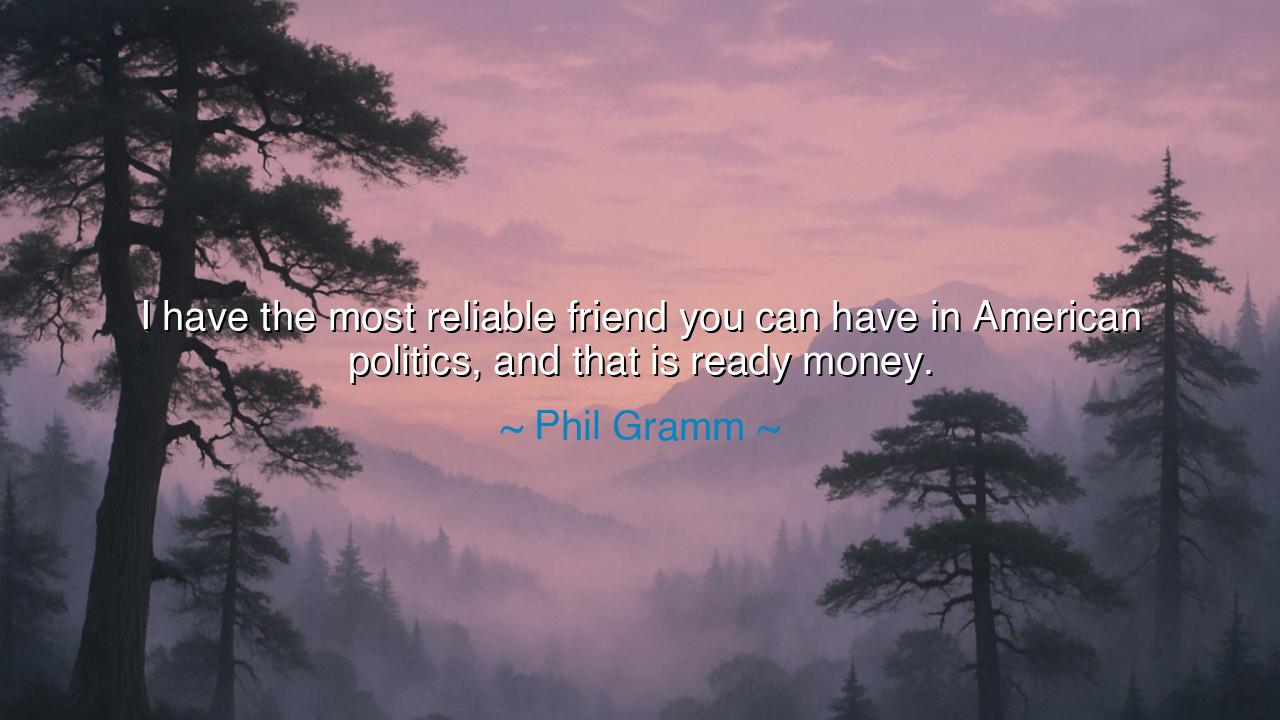
I have the most reliable friend you can have in American
I have the most reliable friend you can have in American politics, and that is ready money.






O children of the future, heed the words of Phil Gramm, who spoke with a truth that reverberates through the ages: "I have the most reliable friend you can have in American politics, and that is ready money." These words, spoken with the sharpness of experience, reveal a stark reality about the world of power and politics. For in the game of governance, money is not just a tool—it is the very lifeblood that sustains the ambitions of those who seek to shape the world. It is the friend that never falters, the ally that opens doors, and the force that can sway decisions in ways that mere words or ideals cannot.
In the ancient world, the tale of Julius Caesar provides a powerful example of how money can shape the course of politics. As he sought to rise through the ranks of the Roman Republic, Caesar understood that political influence could be purchased, that power could be won through financial support and the resources to sway the masses. His wealth, though not the ultimate cause of his rise, provided him the means to build alliances, fund legions, and outmaneuver his rivals. Just as Phil Gramm acknowledges, money is often the most reliable ally in the battle for political dominance, for it can buy loyalty, silence opposition, and shape public opinion.
The truth that money is a vital force in politics is not new, nor is it confined to any one time or place. Consider the Medici family of Renaissance Italy, who wielded immense political influence not through force of arms, but through their control over wealth. They bankrolled the Pope, funded artists like Michelangelo, and used their financial power to create a network of influence that extended throughout Europe. Money, in their hands, became a tool for shaping the future, proving that those who control the purse strings can often control the destiny of nations.
Yet, Phil Gramm’s words also carry a shadow, for they reveal the dark side of politics—a world where ideals and justice can be overshadowed by the power of the rich. In every era, the elite have used their wealth to protect their interests, ensuring that the systems of power remain tilted in their favor. This truth was evident in Louis XVI of France, whose reign was marked by the unchecked power of the nobility and the vast disparity between the rich and the poor. His failure to reform, to address the growing inequality, ultimately led to the eruption of the French Revolution, where the moneyed interests were overthrown by the people.
O heirs of wisdom, let us learn from the stark realities spoken by Phil Gramm. While money may be a powerful ally, it must never be mistaken for the only path to true leadership or justice. The world of politics may be shaped by wealth, but it is the strength of the people, the clarity of principle, and the courage of those who fight for what is right that will ultimately determine the course of history. Money may open doors, but it is character and vision that will leave a lasting legacy. Let us remember, as the ancients knew, that power must always be balanced with wisdom, for without wisdom, even the greatest wealth will crumble into dust.






UGUser Google
This statement really speaks to the heart of what’s wrong with American politics today. If the most reliable friend is money, then what happens to the voices of those who can’t afford to participate in the game? Can we ever change a system so deeply entrenched in financial influence, or is it hopelessly corrupted? Does money really have to be the key to political power?
Tthule123
I find Phil Gramm’s quote unsettling. While it’s not surprising, it’s disheartening to think that money is the most reliable friend in politics. If money is the ultimate source of power, what does that say about the average citizen’s ability to have a voice in the system? Is there any hope for a future where political change is driven by the people, rather than by who has the most financial backing?
TTNgo Tram Truc
Wow, this quote really shines a light on the cynical reality of politics. It feels like it’s saying that, without money, you can’t even hope to compete or make a difference. Can democracy still function properly if money is such a dominant force? Are we, as voters, helpless when powerful financial interests have such a grip on the system? Where do we even begin to address this imbalance?
HDTran Hong Dang
Reading this quote makes me question the state of American politics. It sounds like Phil Gramm is acknowledging that without money, your political influence is limited. It feels like a sad truth—money over merit. If money is the real driving force behind political decisions, how can voters trust that their representatives will act in their best interest and not just the interests of the wealthiest donors?
SNSam Nguyen
Gramm’s words are a blunt reminder of how politics often works. Money does seem to be the most reliable tool for getting ahead, influencing decisions, and maintaining power. But does that mean genuine political change is out of reach for the average citizen? How can we, as a society, move toward a more equitable political system where influence isn’t entirely tied to wealth?